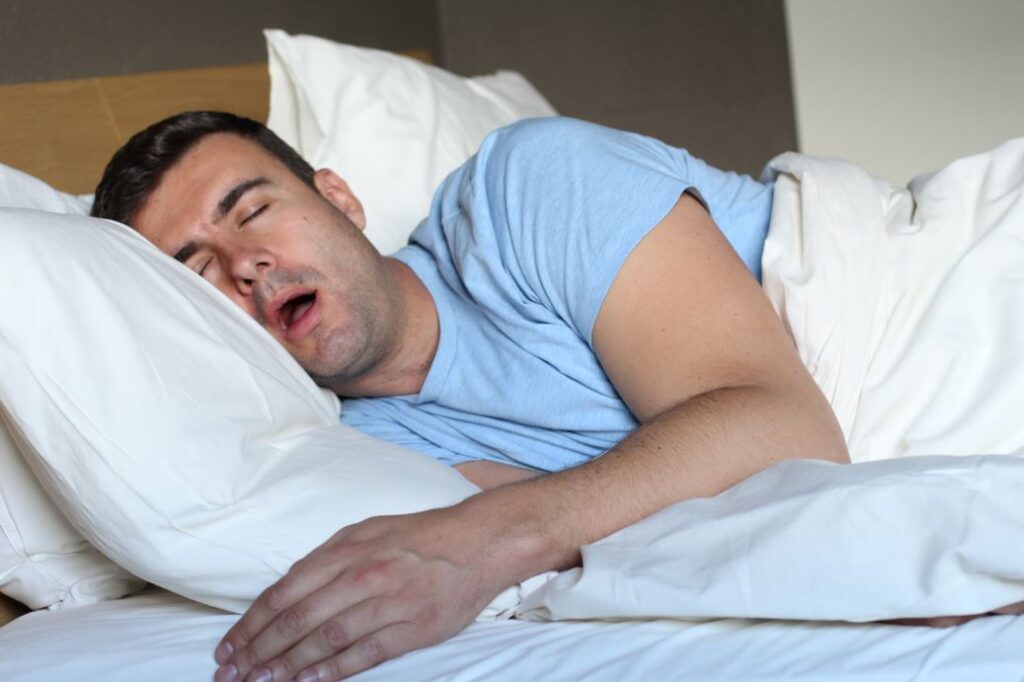
Drooling can be kind of endearing when it comes to puppies and babies, but when you’re a grownup, it’s not quite as adorable. Thankfully, once you’re done teething drooling is mostly a problem of the past, but if you suffer from a sleep disorder like sleep apnea, it can definitely follow you into adulthood.
So, why does sleep apnea increase your risk of drooling as an adult? Here’s what you need to know about the dangers of sleep apnea— and not just the ones to your pillow!
Why Does Sleep Apnea Cause Drooling?
Sometimes during sleep, our position can cause us to drool if our mouth is open. While back sleepers have it relatively easy in this sense, if you are a stomach or side sleeper, your saliva may occasionally drain from your mouth and onto your pillow. Typically, however, if you breathe through your nose this is not a huge problem.
Conversely, if you have sleep apnea, you may sleep with your mouth open as you attempt to take in more air to compensate for the airway blockage causing your apnea. This can also result in gasping for air and snoring, both of which usually require an open mouth as well.
What Are the Warning Signs of Sleep Apnea?
In addition to drooling, there are some other important signs of sleep apnea that you may want to look out for. These include:
- A dry mouth sore throat upon waking up
- Feeling tired and sluggish throughout the day despite sleeping a full night
- Waking up out of breath or feeling startled in the middle of the night
- Difficulty focusing or completing daily tasks that require concentration
Why is Sleep Apnea Dangerous?
Sleep apnea isn’t just “feeling tired” all the time. Not only does it affect your ability to get a good night’s sleep, but it can also cause many extremely dangerous problems that affect you round the clock, including:
- Worsening of serious medical conditions such as diabetes, cancer, Alzheimer’s disease, and stroke
- Low blood oxygen levels
- Cognitive impairment
- Drowsy driving
- Depression and anxiety
How to Stop Drooling with Sleep Apnea
If you find yourself drooling at night, you may find it beneficial to switch your sleeping position to your back if possible. Still, it is important to also treat the underlying cause of your drooling. In the case of sleep apnea, there are options available that can help you stop and get a better night’s sleep, too.
Oral appliance therapy (OAT) uses a custom fit oral device to prop open your airway while you sleep. This will allow you to not only take in air with ease, but it may also reduce your need to sleep with your mouth open, preventing you from drooling. Your sleep trained dentist can customize your appliance for your individual mouth, enabling you to not just get a good night’s rest, but to help reduce your risk of many of the dangerous side effects of sleep apnea.
Get the sleep you deserve without drooling. Speak to your dentist today about treating your sleep apnea with OAT.
About Dr. Bragg
Dr. Jennifer Sherwood Bragg became interested in treating sleep apnea after her beloved husband began suffering from the sleep disorder following surgery for prostate cancer. Instead of wringing her hands with worry, she empowered herself to learn more about this debilitating condition, and eventually became credentialed to treat patients with oral appliance therapy.
Today, Dr. Bragg and her team are dedicated to providing the same quality of care and compassion that started Dr. Bragg on her journey. To treat your own sleep apnea, please schedule an appointment with Sleep Forsyth Dental Sleep Medicine in Cumming by visiting our website or calling us at 470-281-9905 today.

